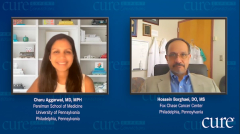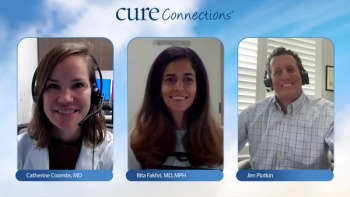
NSCLC: Preparing Patients for Treatment-Related Side Effects
Strategies that can help various health care professionals best mitigate or manage side effects associated with newer treatments in non-small cell lung cancer, such as immunotherapy.
Episodes in this series

Hossein Borghaei, DO, MS: Management of side effects becomes the key part of that initial educational component. We try to provide our patients with some information as to what they’re getting. For instance, we have cards that the patients get when they present for the infusion that say, “You’ve received a checkpoint inhibitor. If you have symptoms such as these and you end up in an emergency department, you should show this card to the emergency department staff so they know what treatments you’ve gotten, or at least have them contact us so we can discuss.”
I tend to go over the key potential toxicities, like pneumonitis and colitis, talk about what some of the presenting signs and symptoms can be, and encourage the patients to call sooner rather than later, emphasizing that the sooner we know, the more effective our treatment interventions can be to avoid things from getting a lot worse. The education of the patients and family members around these toxicities on what to look for is important.
Internally, we’ve trained all the physicians who work here and all the fellows. We have educational components and internal websites, so that if a patient calls and has specific symptoms, they can refer to these and direct the patient appropriately for the treatments. We won’t hesitate to see someone who suddenly has a cough that wasn’t there before. That’s the way you mitigate some of the potential toxic side effects of these treatments. I’m curious about what mechanisms you have. I know that at the University of Pennsylvania, you guys have access to multispecialty care regarding management of these toxicities. Can you talk a little about that?
Charu Aggarwal, M.D., MPH: Absolutely. I have a very similar approach to yours when I’m doing my initial education about what immunotherapy is. I come in with the fact that this is a completely different mechanism of action and that our expected side effects could be very different from what chemotherapy side effects are. I also say it can be global. It could be anything, based on our experience and what we’ve seen in clinical trials, and could affect any part of the body at any time. There isn’t a specific time point that if the patient is past the first X months or X weeks, they’re in the clear. These toxicities can sometimes occur very early, but they can also occur late.
I say that while most toxicity manifests in the form of fatigue or rash, less than 10% of the time, we may have serious organ-related toxicity, be it, like you said, shortness of breath; inflammation in the colon causing diarrhea; inflammation of the thyroid, which occurs very frequently; or things such as inflammation of the heart.
We at the University of Pennsylvania have developed a multidisciplinary group of immunotherapy-related side event management where we have a dedicated team of endocrinologists who help us manage refractory cases of hypothyroidism, for example, or difficult cases of hyperthyroidism going into an exhausted state of hypothyroidism. We have dedicated gastroenterologists who can help us manage oral or topical steroids or locally absorbed steroid applications for patients who develop inflammation. We have cardiologists, pulmonologists, and now rheumatologists and neurologists who specialize in this. We unfortunately have had the experience of having some significant neurotoxicity with these agents. While it’s very hard to predict, once you see it, you can’t forget it. It can manifest in very different forms depending on which part of the brain, which nerve, or which area is inflamed. But having a dedicated multidisciplinary group of experts really helps.
I really like the idea of giving patients a card so they can inform those providers that they’re on immunotherapy. We’re expanding our education efforts to community site emergency department physicians as well as urgent care facilities. While they may not know what to do right away, at least they can reach out to us, call the main hospital, or call the oncologist on call to get some guidance, because it’s so important to intervene early.
Transcript edited for clarity.

